Medication Risk Checker for Orthostatic Hypotension
Check Your Medication Risk
Enter the medications you're currently taking. The tool will identify if any could be causing your dizziness when standing.
Standing up and feeling like the room is spinning? That sudden wave of dizziness, blurred vision, or even fainting isn’t just bad luck-it could be your medications. Orthostatic hypotension is a common but often overlooked side effect of many drugs, especially in older adults. It happens when your blood pressure drops too fast after standing, and your brain doesn’t get enough blood fast enough. This isn’t just uncomfortable-it’s dangerous. Falls, fractures, and even long-term cognitive decline are real risks tied to this condition.
What Exactly Is Orthostatic Hypotension?
Orthostatic hypotension, also called postural hypotension, is defined by a clear drop in blood pressure when you stand: a systolic (top number) drop of 20 mm Hg or more, or a diastolic (bottom number) drop of 10 mm Hg or more, within three minutes of standing. It’s not just about feeling lightheaded. It’s a measurable, clinical event backed by decades of research. The Merck Manual and the American Family Physician both confirm this diagnostic standard, and it’s not something you can ignore.When you stand, gravity pulls blood down into your legs. Normally, your body responds by tightening blood vessels and increasing heart rate to keep blood flowing to your brain. But when medications interfere with that reflex, your body can’t compensate fast enough. The result? Dizziness, tunnel vision, nausea, or worse-falling.
Which Medications Cause This?
Not all drugs cause orthostatic hypotension, but many common ones do. The risk isn’t random-it’s tied to how the drug works in your body. Here are the biggest culprits:- Antihypertensives-drugs meant to lower blood pressure can sometimes lower it too much when standing. This includes diuretics like hydrochlorothiazide, ACE inhibitors like lisinopril, and calcium channel blockers.
- Alpha-blockers-used for prostate issues and high blood pressure, these relax blood vessels and are among the strongest offenders. Doxazosin and terazosin can cause OH in up to 30% of users.
- Tricyclic antidepressants-medications like amitriptyline and nortriptyline block norepinephrine, which is critical for maintaining blood pressure. Studies show they increase OH risk by over three times.
- Antipsychotics-especially older ones like chlorpromazine and clozapine. Clozapine causes OH in 35-45% of patients. Even newer ones like quetiapine carry a 20-30% risk.
- Opioids-morphine, oxycodone, and hydrocodone can depress the autonomic nervous system. About 15-25% of elderly patients on opioids report dizziness on standing, and the risk spikes when mixed with alcohol or benzodiazepines.
- Parkinson’s medications-levodopa is a major trigger. Up to half of patients on long-term levodopa develop OH because it interferes with norepinephrine production.
Here’s the kicker: it’s rarely just one drug. Most people with OH are on four or more medications. A 2022 study found those taking four or more drugs have over five times the risk of OH compared to those on one or two. Polypharmacy isn’t just a buzzword-it’s a silent danger.
Why Older Adults Are at Higher Risk
Age isn’t just a number here-it’s a physiological reality. As we get older, our blood vessels stiffen, our baroreceptors (the body’s pressure sensors) become less responsive, and our kidneys hold onto less fluid. All of this makes it harder to maintain blood pressure when standing.People over 70 are 3.2 times more likely to develop orthostatic hypotension than younger adults. Combine that with age-related decline in muscle tone and slower reflexes, and you’ve got a perfect storm for falls. In fact, those with OH have a 15-30% higher risk of falling. And falls in older adults aren’t minor-they lead to fractures, hospitalizations, loss of independence, and even death.
Even more concerning: up to 40% of people with OH don’t even feel symptoms. They might just think they’re getting a little slower. But their blood pressure is still dropping. That’s why screening matters.
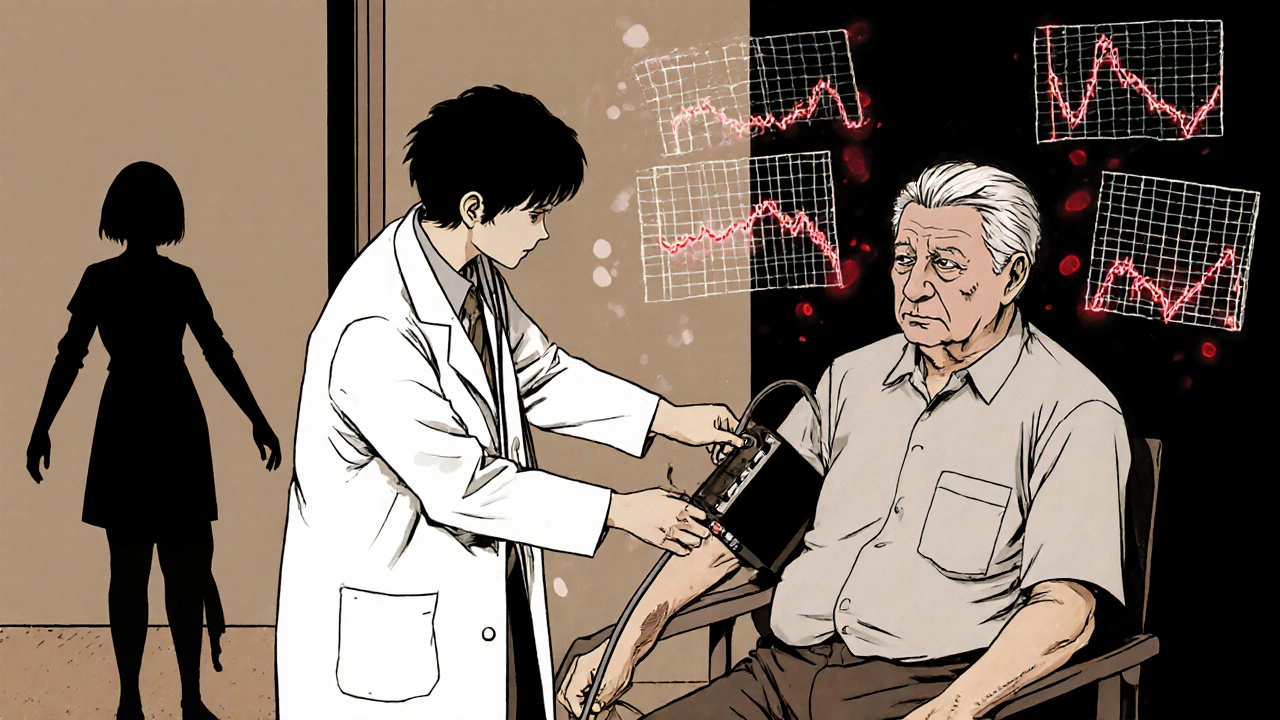
How Doctors Diagnose It
It’s not guesswork. Diagnosis requires a simple, repeatable test: measure blood pressure while lying down, then again at 1, 2, and 3 minutes after standing. The key is timing. If the drop happens after 3 minutes, it’s not orthostatic hypotension-it might be something else.Doctors also check for other clues: Is your heart rate jumping? That suggests volume depletion (like dehydration), not neurogenic OH. If your heart rate stays flat while your blood pressure crashes, it points to autonomic failure-often from Parkinson’s or diabetes. But if you’re on meds and your BP drops sharply, it’s likely drug-induced.
Many cases go undiagnosed because symptoms are dismissed as "just getting older." But in one Mayo Clinic study, 55% of patients had symptoms for over two months before anyone connected them to their medications. That’s unacceptable.
What You Can Do Right Now
You don’t have to live with dizziness. Here’s what works:- Review your meds-Talk to your doctor or pharmacist. Don’t stop anything on your own, but ask: "Could any of these be causing my dizziness?" Especially if you’re on more than four drugs.
- Stand up slowly-Take your time. Sit on the edge of the bed for 30 seconds before standing. Use a handrail. Don’t rush.
- Hydrate-Drink 2 to 2.5 liters of water daily. Dehydration makes OH worse. A glass of water before standing can help.
- Wear compression stockings-These help push blood back up from your legs. They’re not glamorous, but they work. Studies show they reduce symptoms in over 60% of patients.
- Avoid heat and alcohol-Hot showers, saunas, and alcohol all dilate blood vessels and make OH worse.
Some people need medication adjustments. For example, switching from a long-acting alpha-blocker to a shorter-acting one, or lowering the dose of an antidepressant. In one case from Cleveland Clinic’s patient forum, removing hydrochlorothiazide from a 78-year-old’s regimen resolved OH completely within 72 hours.
When Medication Changes Are Needed
Sometimes, the best treatment is stopping or changing the drug causing the problem. But that’s not always easy. If you’re on a blood pressure med for heart disease, or an antipsychotic for schizophrenia, you can’t just quit. The goal is balance.Experts recommend a step-by-step approach:
- Identify the most likely culprit (often the newest drug or the one with the highest OH risk).
- Try reducing the dose first.
- If that doesn’t help, consider switching to a safer alternative. For example, ziprasidone has a much lower OH risk than clozapine. Sertraline is often safer than amitriptyline.
- If symptoms persist and the drug is essential, doctors may add midodrine-a medication that tightens blood vessels. It’s not a first-line fix, but it helps when non-drug methods fail.
Studies show 65-80% of patients see major improvement after adjusting their meds. That’s not a small number. It means most of this is preventable.
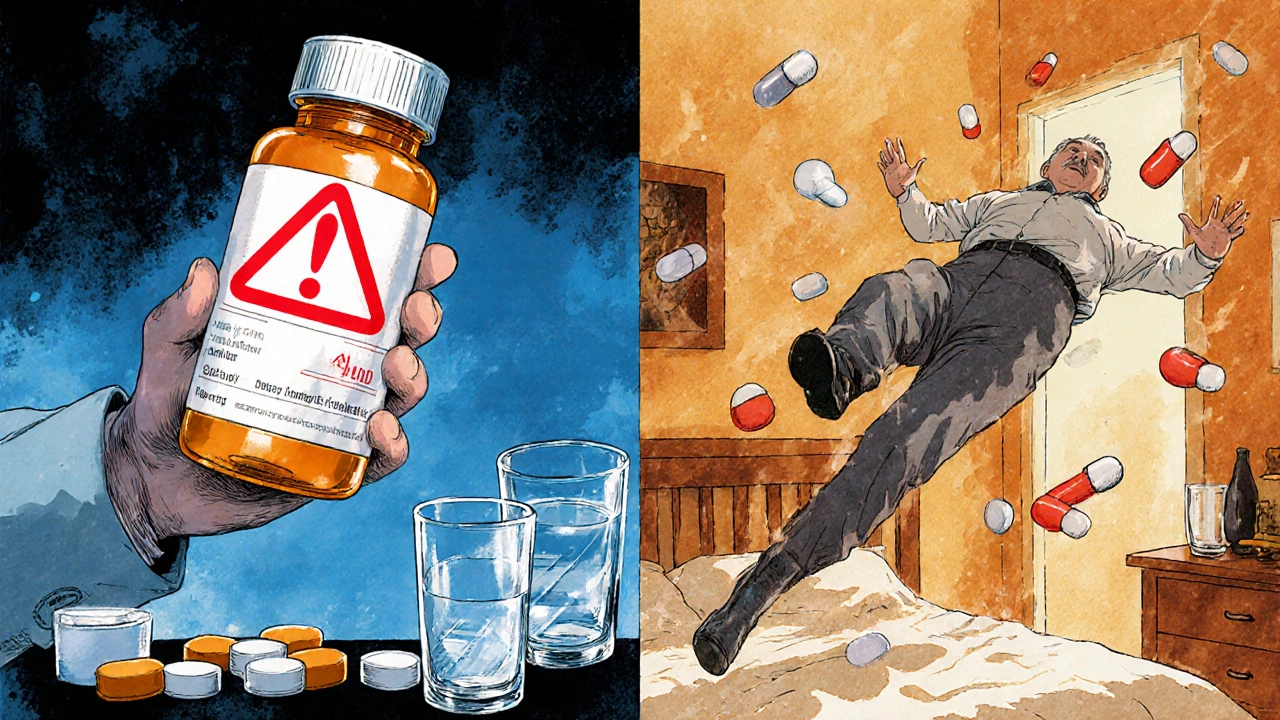
The Bigger Picture: Why This Matters
Orthostatic hypotension isn’t just about dizziness. It’s linked to a 24-32% higher risk of death over 10 years. It increases the chance of stroke, heart attack, and dementia. And financially, it’s a burden: OH-related falls cost Medicare $31 billion in 2022 alone. About a third of those costs come from drug-induced cases.That’s why guidelines have changed. The American Geriatrics Society’s 2022 Beers Criteria now lists 12 specific drugs as high-risk for OH in older adults. And since 2020, the FDA requires drug labels to include OH risk if it’s seen in more than 5% of clinical trial participants.
More clinics are screening. More pharmacists are flagging risks. But it still falls through the cracks. If you or a loved one is feeling dizzy when standing, don’t wait. Bring it up. Ask for a blood pressure check. Ask if any meds could be the cause.
What’s Next?
The future of managing OH is getting smarter. Researchers are developing drugs designed to avoid OH entirely-like alpha-1A selective agonists that tighten blood vessels without overdoing it. Genetic tests to predict who’s at higher risk are in early trials. Personalized medicine might one day tell you, "This drug is dangerous for you because of your autonomic profile. Try this one instead."But for now, the best tools are simple: awareness, communication, and slow, deliberate movement. You don’t need a high-tech solution to prevent a fall. You just need to know what’s causing it-and the courage to ask about it.
Can orthostatic hypotension go away on its own?
Yes, if it’s caused by medication. In 70-85% of cases, symptoms improve or disappear after adjusting or stopping the drug. It can take days to a few weeks. But if OH is caused by nerve damage (like from Parkinson’s or diabetes), it’s unlikely to go away without treatment. The key is figuring out the cause.
Is dizziness on standing always serious?
Not always-but it shouldn’t be ignored. Mild dizziness that resolves in seconds might just be dehydration or fatigue. But if it happens often, lasts longer than a minute, or is followed by fainting, it’s a red flag. Especially if you’re on medications or over 70. Get it checked.
Can I still take my blood pressure medicine if I have orthostatic hypotension?
Yes, but your doctor may need to adjust it. The goal isn’t to stop treating high blood pressure-it’s to find the right balance. Lowering the dose, switching to a different class of drug, or changing the time you take it (like taking it at night) can reduce dizziness without raising your overall blood pressure risk.
Do compression stockings really help with dizziness?
Yes. Studies show they reduce symptoms in over 60% of people with medication-induced orthostatic hypotension. They work by squeezing your legs and helping blood return to your heart and brain. Medical-grade stockings (20-30 mmHg pressure) are most effective. Don’t buy cheap ones-they won’t help.
How long does it take to feel better after changing a medication?
Most people notice improvement within 3-7 days after stopping or reducing the offending drug. For some, it takes up to two weeks, especially if the medication stayed in their system for a while. If there’s no change after two weeks, talk to your doctor-another drug might be the culprit.
Should I avoid standing up quickly even if I’m not on meds?
It’s always a good habit. Even if you’re healthy, standing up too fast can cause a brief dip in blood pressure. Slowing down reduces the chance of dizziness and helps your body adjust. It’s especially important if you’re over 60, dehydrated, or have diabetes or heart disease.
What to Do Next
If you’ve been feeling dizzy when standing, start with these three steps:- Write down every medication you take-including supplements and over-the-counter drugs.
- Track when the dizziness happens: after standing? After meals? After taking a pill?
- Book an appointment with your doctor or pharmacist. Say: "I’ve been getting dizzy when I stand up. I think it might be my meds. Can we review them?"
You don’t need to suffer in silence. Orthostatic hypotension is common, treatable, and often preventable. The sooner you act, the safer you’ll be.

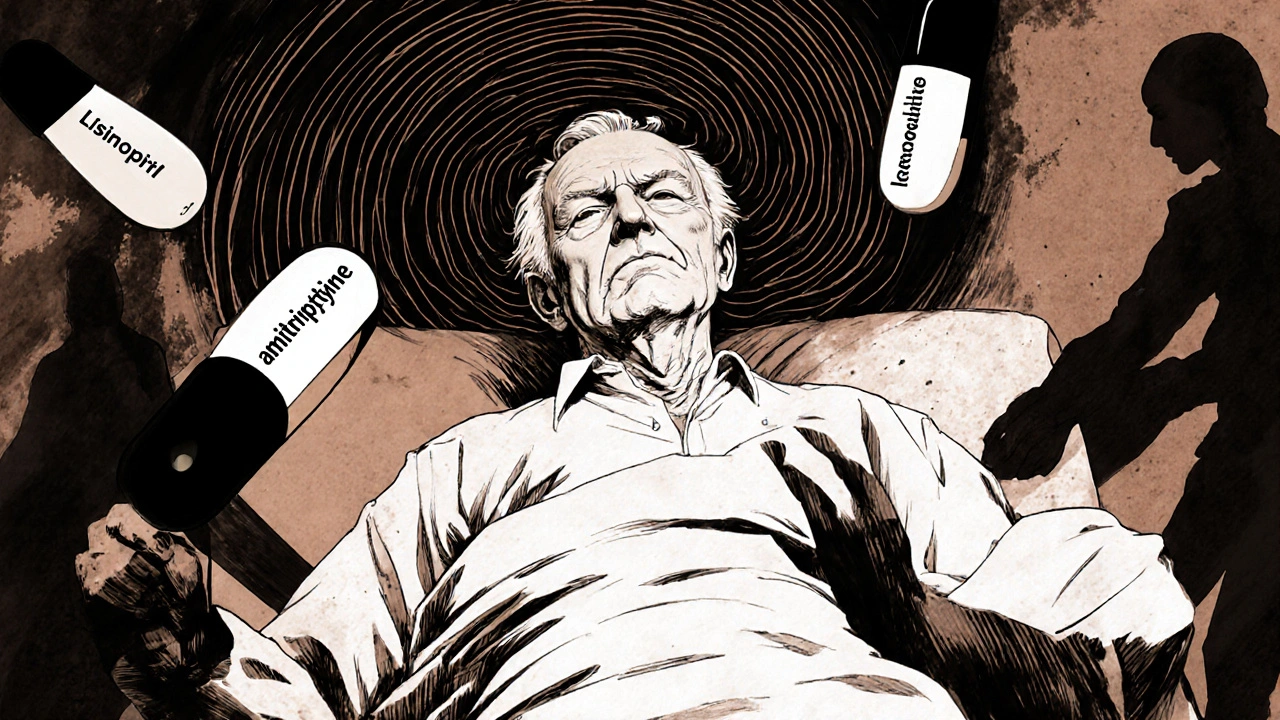
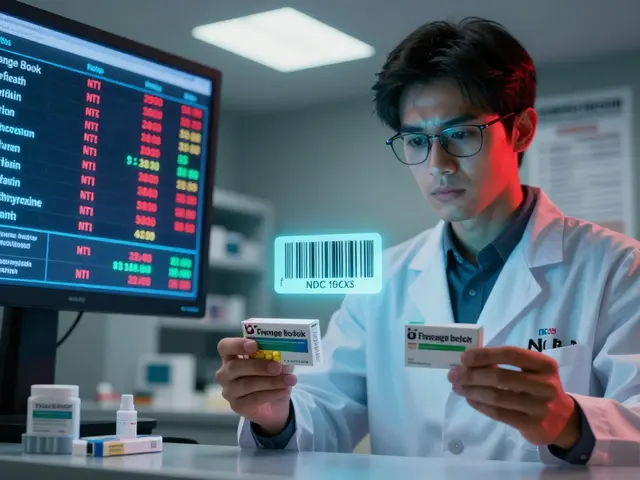
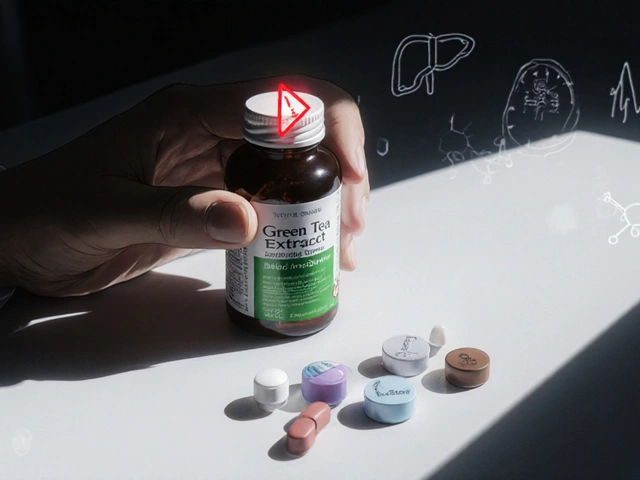
Andrea Gracis
October 30, 2025 AT 21:45i kept getting dizzy when i stood up and thought i was just getting old... turns out it was my blood pressure med and that stupid antidepressant i was on for years. i asked my doc to switch me to sertraline and boom, no more room-spinning. why does no one tell you this stuff?
Matthew Wilson Thorne
November 1, 2025 AT 16:48Orthostatic hypotension is a well-documented phenomenon. The literature is clear. Your post is accurate, but overly verbose.
April Liu
November 2, 2025 AT 04:35YESSSS this!! 🙌 I’m a nurse and I see this ALL the time - older folks thinking it’s just ‘getting older’ when it’s totally fixable. Compression socks aren’t sexy but they’re magic. And PLEASE talk to your pharmacist - they’re the real MVPs here. You got this 💪
Emily Gibson
November 2, 2025 AT 14:00It’s wild how many of us just live with dizziness like it’s normal. I had a friend who fell three times before anyone linked it to her meds. She’s 74, on four drugs, and now she’s walking without fear. Small changes, big wins. You’re not alone if this is you.
Mirian Ramirez
November 3, 2025 AT 03:01so i was just reading this and i realized my mom’s been saying she feels light-headed ever since they switched her to that new blood pressure pill last year... i didn’t think much of it cause she’s 81 and i thought it was just age but now i’m gonna bring this article to her dr. and also she’s been wearing those cheap compression socks from walmart and they’re not helping at all, so i’m gonna get her the medical ones like 20-30 mmHg, you know? because apparently cheap ones are useless and i didn’t even know that, wow. also she drinks like 3 liters of water a day now and she says she feels better, but i still think we should check her meds, like maybe she can drop one? she’s on like 7 things???
Kika Armata
November 4, 2025 AT 19:38How disappointing that this level of clinical awareness still requires a blog post. The 2022 Beers Criteria have been public for two years, yet primary care physicians continue to prescribe high-risk antihypertensives to elderly patients without even mentioning orthostatic risk. The FDA labeling requirement is a start, but enforcement is laughable. This isn’t patient education - it’s systemic negligence.
Herbert Lui
November 4, 2025 AT 20:49There’s something deeply human about standing up - it’s this tiny act of defiance against gravity. And when your body betrays you in that moment? It’s not just dizziness. It’s a reminder that we’re fragile, temporary things, held together by chemistry and clockwork. And yet - we keep standing. Slowly. Carefully. With handrails and water and socks that squeeze like a hug from the inside. That’s courage. Not the big kind. The quiet, daily kind.
Nick Zararis
November 6, 2025 AT 00:18Hydrate. Stand slow. Review meds. Compression socks. Avoid heat. Avoid alcohol. All of this is critical. Don’t ignore it. Don’t dismiss it. Don’t assume it’s ‘just aging.’ You’re not alone. You’re not crazy. You’re not weak. This is measurable. This is treatable. And you deserve to stand without fear.
Sara Mörtsell
November 6, 2025 AT 19:34Everyone’s so quick to blame the meds... but what about the doctors who prescribe them like candy? I’ve seen people on 8+ drugs with zero review. No one checks for interactions. No one asks about dizziness. It’s not the patient’s fault. It’s the system. And the system is broken. And you know what? I’m not sorry for being angry about it.
Rhonda Gentz
November 8, 2025 AT 04:37There’s a quiet loneliness in dizziness. You don’t tell people because they’ll say, ‘Oh, you’re just getting older.’ But you know. You feel the world tilt. And you learn to move slower. To sit longer. To hold on. And maybe that’s the real lesson here - not about meds or blood pressure, but about learning to move through the world with gentleness. Even when your body forgets how to hold you up.